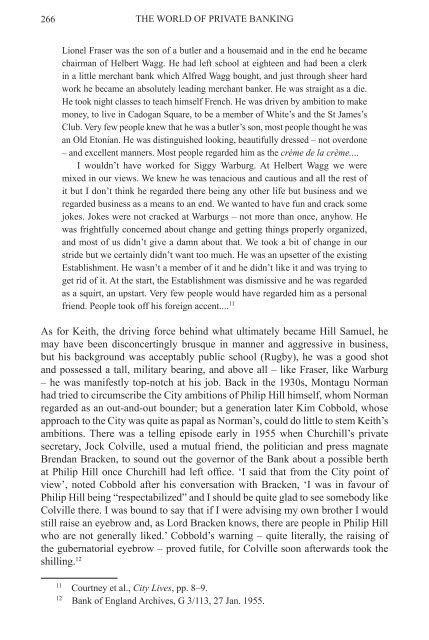the world of private banking
the world of private banking
the world of private banking
Create successful ePaper yourself
Turn your PDF publications into a flip-book with our unique Google optimized e-Paper software.
266<br />
THE WORLD OF PRIVAtE BANKING<br />
Lionel Fraser was <strong>the</strong> son <strong>of</strong> a butler and a housemaid and in <strong>the</strong> end he became<br />
chairman <strong>of</strong> Helbert Wagg. He had left school at eighteen and had been a clerk<br />
in a little merchant bank which Alfred Wagg bought, and just through sheer hard<br />
work he became an absolutely leading merchant banker. He was straight as a die.<br />
He took night classes to teach himself French. He was driven by ambition to make<br />
money, to live in Cadogan Square, to be a member <strong>of</strong> White’s and <strong>the</strong> St James’s<br />
Club. Very few people knew that he was a butler’s son, most people thought he was<br />
an Old Etonian. He was distinguished looking, beautifully dressed – not overdone<br />
– and excellent manners. Most people regarded him as <strong>the</strong> crème de la crème....<br />
I wouldn’t have worked for Siggy Warburg. At Helbert Wagg we were<br />
mixed in our views. We knew he was tenacious and cautious and all <strong>the</strong> rest <strong>of</strong><br />
it but I don’t think he regarded <strong>the</strong>re being any o<strong>the</strong>r life but business and we<br />
regarded business as a means to an end. We wanted to have fun and crack some<br />
jokes. Jokes were not cracked at Warburgs – not more than once, anyhow. He<br />
was frightfully concerned about change and getting things properly organized,<br />
and most <strong>of</strong> us didn’t give a damn about that. We took a bit <strong>of</strong> change in our<br />
stride but we certainly didn’t want too much. He was an upsetter <strong>of</strong> <strong>the</strong> existing<br />
Establishment. He wasn’t a member <strong>of</strong> it and he didn’t like it and was trying to<br />
get rid <strong>of</strong> it. At <strong>the</strong> start, <strong>the</strong> Establishment was dismissive and he was regarded<br />
as a squirt, an upstart. Very few people would have regarded him as a personal<br />
friend. People took <strong>of</strong>f his foreign accent.... 11<br />
As for Keith, <strong>the</strong> driving force behind what ultimately became Hill Samuel, he<br />
may have been disconcertingly brusque in manner and aggressive in business,<br />
but his background was acceptably public school (Rugby), he was a good shot<br />
and possessed a tall, military bearing, and above all – like Fraser, like Warburg<br />
– he was manifestly top-notch at his job. Back in <strong>the</strong> 1930s, Montagu Norman<br />
had tried to circumscribe <strong>the</strong> City ambitions <strong>of</strong> Philip Hill himself, whom Norman<br />
regarded as an out-and-out bounder; but a generation later Kim Cobbold, whose<br />
approach to <strong>the</strong> City was quite as papal as Norman’s, could do little to stem Keith’s<br />
ambitions. There was a telling episode early in 1955 when Churchill’s <strong>private</strong><br />
secretary, Jock Colville, used a mutual friend, <strong>the</strong> politician and press magnate<br />
Brendan Bracken, to sound out <strong>the</strong> governor <strong>of</strong> <strong>the</strong> Bank about a possible berth<br />
at Philip Hill once Churchill had left <strong>of</strong>fice. ‘I said that from <strong>the</strong> City point <strong>of</strong><br />
view’, noted Cobbold after his conversation with Bracken, ‘I was in favour <strong>of</strong><br />
Philip Hill being “respectabilized” and I should be quite glad to see somebody like<br />
Colville <strong>the</strong>re. I was bound to say that if I were advising my own bro<strong>the</strong>r I would<br />
still raise an eyebrow and, as Lord Bracken knows, <strong>the</strong>re are people in Philip Hill<br />
who are not generally liked.’ Cobbold’s warning – quite literally, <strong>the</strong> raising <strong>of</strong><br />
<strong>the</strong> gubernatorial eyebrow – proved futile, for Colville soon afterwards took <strong>the</strong><br />
shilling. 12<br />
11<br />
Courtney et al., City Lives, pp. 8–9.<br />
12<br />
Bank <strong>of</strong> England Archives, G 3/113, 27 Jan. 1955.












![[Pham_Sherisse]_Frommer's_Southeast_Asia(Book4You)](https://img.yumpu.com/38206466/1/166x260/pham-sherisse-frommers-southeast-asiabook4you.jpg?quality=85)



